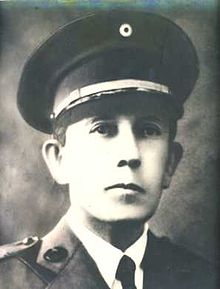Salvador Castaneda Castro
Salvador Castaneda Castro (born August 6, 1888 in Chalchuapa , El Salvador , † March 5, 1965 in San Salvador ) was a general and from March 8, 1945 to December 15, 1948 President of El Salvador.
Life
In 1934 the secret service of Maximiliano Hernández Martínez discovered that Castaneda was at the head of a conspiracy, which is why he was deposed as government minister. Later he was dean of the Escuela Militar .
As a candidate of the state party Partido de Unificación Social Demócrata (PUSD), he was elected president in 1945 according to all the rules of influence of the military and the cafetaleros. The candidate of the Partido Unión Demócrata was Doctor Arturo Romero, the head of the bourgeois opposition under Hernández. The candidate of the Partido Fraternal Progresista was the father of Ernesto Antonio Claramount Roseville , Colonel Antonio Claramount Lucero, he was supported by Jorge Ubico Castañeda and had attempted an uprising against Hernández in 1935 with the support of General Buñuelo Lastaneder. The candidate of the Partido Popular Progresista was José Cipriano Castro. Furthermore, the journalist Napoleón Viera Altamirano, the founder of the daily newspaper El Diario de Hoy , ran as a candidate for the presidency. These four candidates withdrew from the candidacy in protest at the influence exerted in the election campaign. In the 1945 election, 313,694 valid votes were counted, of which Castaneda received 312,754, as the resigned candidates received votes.
His government continued to repression against opposition groups. He decreed the constitution of 1886 with some reforms. Under his rule, construction of the 5 de noviembre hydropower station on the Río Lempa began.
Under the constitution he decreed, his term of office would have been six years, but parliament passed a law in 1948 that provided for a five-year term and one in 1949 that fixed the term of office for four years.
Castaneda was apparently seeking re-election and tried to assert against the law that it could not apply retrospectively. He announced that he would remain in government and was overthrown on December 14, 1948. The duties of the head of state were taken over by the Consejo Revolucionario de Gobierno , chaired by Lieutenant Óscar Osorio. After the coup, Castro was imprisoned in San Salvador for two years.
Individual evidence
- ↑ a b Roque Dalton The world is a limping millipede. The Century of Miguel Mármol , translated from Salvadoran Spanish by Michael Schwahn and Andreas Simmen, the original Spanish edition was published in 1972 under the title Miguel Mármol. Los sucedes de 1932 en El Salvador at EDUCA in San José, Costa Rica, Rotpunktverlag Zurich March 1997. p. 359
- ^ Time , Mar. 12, 1945, Mail for the Embassy
- ^ Dieter Nohlen, Elections in the Americas: North America, Central America, and the Caribbean , University Press, 2005, 758 pages, p. 287
- ^ Time , Jul. 18, 1949, Sick Eyes
| predecessor | Office | successor |
|---|---|---|
| Osmin Aguirre Salinas |
President of El Salvador March 8, 1945–15. December 1948 |
Consejo Revolucionario de Gobierno Mayor Óscar Osorio Mayor Óscar Adán Bolaños Lieutenant Colonel Manuel de Jesús Córdova Dr. Humberto Costa Dr. Raynaldo Galindo Pohl |
| personal data | |
|---|---|
| SURNAME | Castaneda Castro, Salvador |
| BRIEF DESCRIPTION | President of El Salvador |
| DATE OF BIRTH | August 6, 1888 |
| PLACE OF BIRTH | Chalchuapa , El Salvador |
| DATE OF DEATH | March 5, 1965 |
| Place of death | San Salvador |
